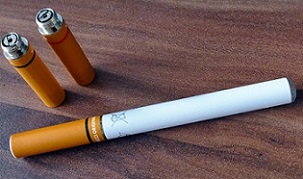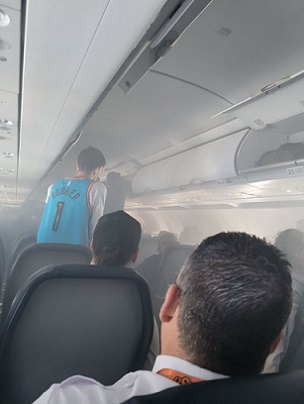 E-cigarettes are potentially dangerous on planes even though you can’t smoke on board
E-cigarettes are potentially dangerous on planes even though you can’t smoke on board
 Smoke filling a passenger cabin after a lithium battery incident on board
Smoke filling a passenger cabin after a lithium battery incident on board
 An AvSax lithium battery fire containment bag which won the Queen’s Award for Enterprise
An AvSax lithium battery fire containment bag which won the Queen’s Award for Enterprise
Overheating lithium batteries have sparked fire scares on three passenger planes in recent weeks … but in each case they were dealt with by quick-thinking crew using thermal fire mitigation bags.
All three incidents happened in American airspace and have been made public by the Federal Aviation Administration which regulates civil aviation in the USA.
In every case the planes continued to their final destinations with no-one hurt. Sometimes aircraft not equipped with thermal bags have to divert and make emergency landings which can prove very disruptive for the passengers and costly for the airline companies.
Lithium batteries power all our everyday electronic devices such as mobile phones, laptops, iPads, vapes and e-cigarettes … and two of these incidents were caused by e-cigarettes.
When a lithium battery overheats it goes into a chemical process called thermal runaway and when this happens one cell in a battery can produce enough heat – up to 900°C (1652°F) – to cause adjacent cells to overheat. This can cause a lithium battery fire to flare repeatedly and they are then very difficult to put out which is why fire mitigation bags are so important, especially in the confined space of aircraft passenger cabins.
The first incident happened on a United Airlines flight from Portland to Chicago on September 30, 2023, when a passenger’s laptop computer began to overheat while powered on. A flight attendant placed the laptop computer into a thermal containment bag.
The second also happened on a United Airlines flight, this time from Orlando in Florida to Chicago on October 5, 2023, when a passenger’s e-cigarette started to overheat and again a flight attendant acted quickly to get the device into a lithium battery containment bag.
The third incident was on an Avelo Airlines flight on October 11, 2023, from Morrisville, North Carolina, to Tampa in Florida and, once more, the problem was caused by an overheating e-cigarette which was in the passenger’s purse. The device was again put in a fire containment bag.
The ever increasing number of lithium battery incidents on aircraft means that many airline operators now have thermal mitigation bags on board to deal swiftly and decisively with the problem before anyone is hurt or the aircraft is damaged.
The best selling one by far is the AvSax which is now on almost 17,000 planes operated by around 100 airlines.
The AvSax won the Queen’s Award for Enterprise for its innovation in the UK – the highest award any business can achieve.
The reason it’s so popular among airlines is that it continually cools the overheating device while containing it.
The UK’s regulatory organisation the Civil Aviation Authority says: “Since the development of the International Civil Aviation Organization guidance on dealing with an in-flight battery fire, new products designed for use in response to lithium battery thermal runaway events have become available.
“Products which provide both a cooling and containment capability are typically more aligned to the existing ICAO guidance as when used they are filled with water or other non-flammable liquid to act as a cooling agent.
“After knocking down flames it could conceivably take just a couple of seconds for a personal electronic device to be placed inside a containment bag, allowing it to be moved to a place of safety.
“Passengers could then return to their seats, mitigating potential unrelated safety hazards such as injury in the case of severe turbulence. Equally, the effect on flight crew in carrying out their duties following an event on the flight deck would be minimised.”
For more information on AvSax go to www.avsax.com